2019-2020学年人教版英语九年级Unit4I used to be afraid of the
- 格式:doc
- 大小:56.00 KB
- 文档页数:2
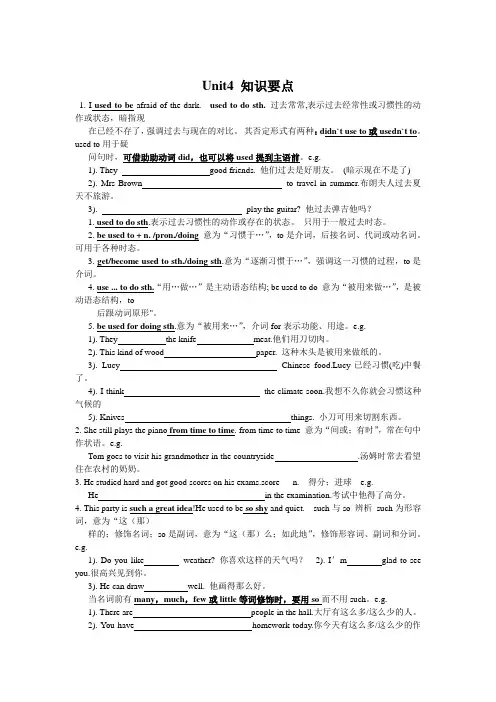
Unit4 知识要点1. I used to be afraid of the dark. used to do sth.过去常常,表示过去经常性或习惯性的动作或状态,暗指现在已经不存了,强调过去与现在的对比。
其否定形式有两种:didn`t use to或usedn`t to。
used to用于疑问句时,可借助助动词did,也可以将used提到主语前。
e.g.1). They good friends. 他们过去是好朋友。
(暗示现在不是了)2). Mrs Brown to travel in summer.布朗夫人过去夏天不旅游。
3). play the guitar? 他过去弹吉他吗?1. used to do sth.表示过去习惯性的动作或存在的状态。
只用于一般过去时态。
2. be used to + n. /pron./doing意为“习惯于…”,to是介词,后接名词、代词或动名词。
可用于各种时态。
3. get/become used to sth./doing sth.意为“逐渐习惯于…”,强调这一习惯的过程,to是介词。
4. use ... to do sth.“用…做…”是主动语态结构; be used to do 意为“被用来做…”,是被动语态结构,to后跟动词原形"。
5. be used for doing sth.意为“被用来…”,介词for表示功能、用途。
e.g.1). They the knife meat.他们用刀切肉。
2). This kind of wood paper. 这种木头是被用来做纸的。
3). Lucy Chinese food.Lucy已经习惯(吃)中餐了。
4). I think the climate soon.我想不久你就会习惯这种气候的5). Knives things. 小刀可用来切割东西。
2. She still plays the piano from time to time. from time to time 意为“间或;有时”,常在句中作状语。
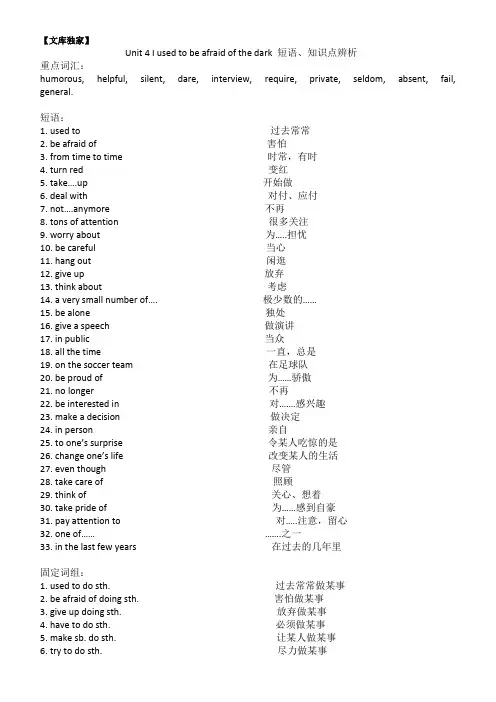
【文库独家】Unit 4 I used to be afraid of the dark 短语、知识点辨析重点词汇:humorous, helpful, silent, dare, interview, require, private, seldom, absent, fail, general.短语:1. used to 过去常常2. be afraid of 害怕3. from time to time 时常,有时4. turn red 变红5. take….up 开始做6. deal with 对付、应付7. not….anymore 不再8. tons of attention 很多关注9. worry about 为…..担忧10. be careful 当心11. hang out 闲逛12. give up 放弃13. think about 考虑14. a very small number of…. 极少数的……15. be alone 独处16. give a speech 做演讲17. in public 当众18. all the time 一直,总是19. on the soccer team 在足球队20. be proud of 为……骄傲21. no longer 不再22. be interested in 对…….感兴趣23. make a decision 做决定24. in person 亲自25. to one’s surprise 令某人吃惊的是26. change one’s life 改变某人的生活27. even though 尽管28. take care of 照顾29. think of 关心、想着30. take pride of 为……感到自豪31. pay attention to 对…..注意,留心32. one of………….之一33. in the last few years 在过去的几年里固定词组:1. used to do sth. 过去常常做某事2. be afraid of doing sth. 害怕做某事3. give up doing sth. 放弃做某事4. have to do sth. 必须做某事5. make sb. do sth. 让某人做某事6. try to do sth. 尽力做某事7. adj. + enough to do sth. 足够……而能做某事8. be prepared to do sth. 准备做某事9. see sb. doing sth. 看见某人在做某事10. take up doing sth. 开始做某事11. begin to do sth. 开始做某事12. require sb. to do sth. 要求某人做某事13. decide to do sth. 决定做某某14. make a decision to do sth. 决定做某事15. It’s hard to believe that……很难相信……….16. It has been + 一段时间+ since + 从句自从……以来已经有很长的时间了17. dare to do sth. 敢于做某事18. It’s + adj. + for sb. + to do sth. 对某人来说做某事是……的重点句型:1. I used to be afraid of the dark. 我过去常常怕黑。
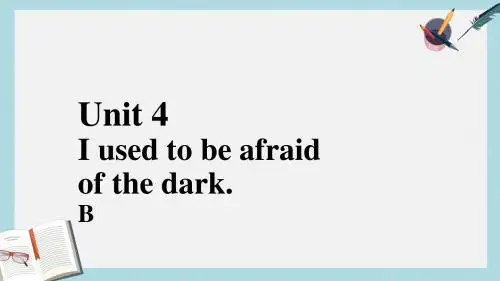
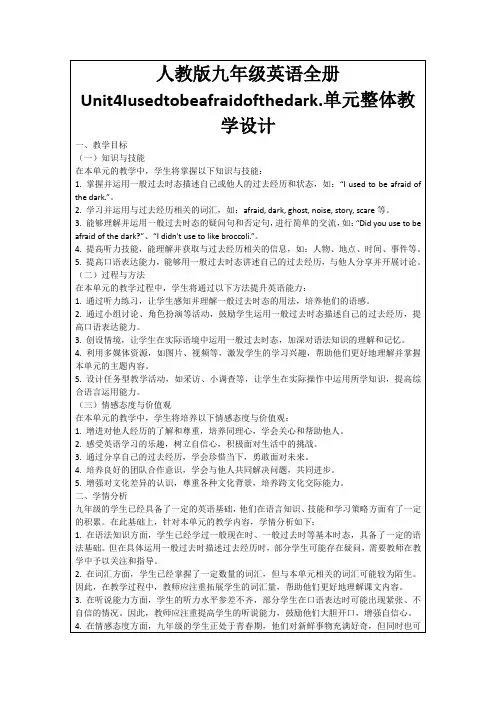
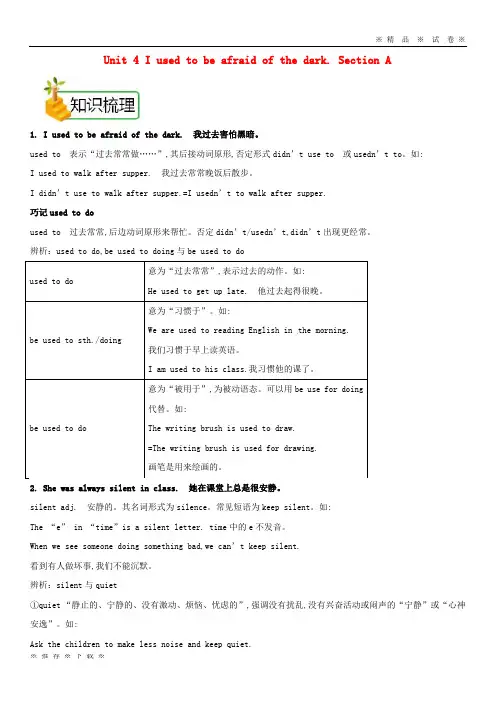
Unit 4 I used to be afraid of the dark. Section Athe morning.让孩子们小点声,保持安静。
②silent “声音极小的、沉默的、寡言的”。
如:John is a silent,thoughtful boy. 约瀚是个不爱讲话,喜欢思考的孩子。
The house was silent because everyone was asleep.房子里很安静,所有的人都睡着了。
3. She still plays the from time to time. 她依旧不时地弹奏。
from time to time 为介词短语,意为“时不时地”。
同义词组为sometimes,at time。
例如:The temper gets the best of him from time to time. 他有时控制不住自己的脾气。
From time to time he fired questions at me. 他不时向我提出许多问题。
归纳有关time的短语:on time准时;in time 及时;all the time一直;kill the time 消磨时间have a good time玩得开心;once upon a time 从前;很久很久以前4. It’s been three years since we last saw our primary school classmates.距离我们最后一次见到小学同学已经三年了。
(1)该句型是:It is(has been)+时间+since+持续性动词的过去时,表示“自从……以来到现在已有多久。
”例如: It has been quite some time since I was last in London.我上次离开伦敦至今颇有一段时间了。
还可用于句型:It was+时间+since+持续性动词的过去完成时,表示“从……到过去某时间点以来”。
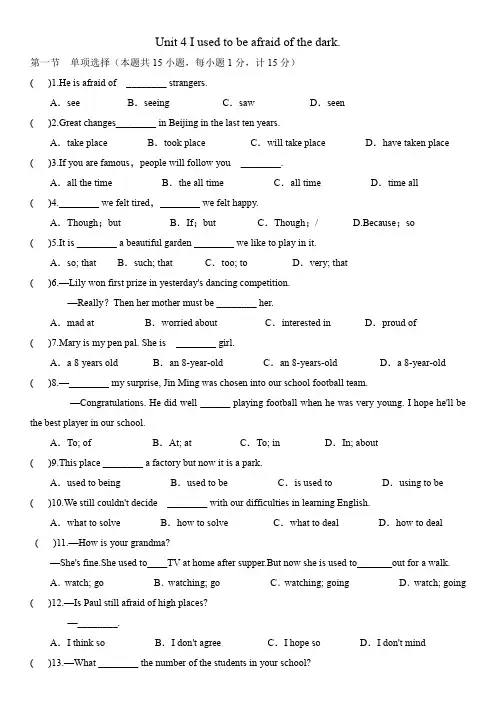
Unit 4 I used to be afraid of the dark.第一节单项选择(本题共15小题,每小题1分,计15分)( )1.He is afraid of ________ strangers.A.see B.seeing C.saw D.seen( )2.Great changes________ in Beijing in the last ten years.A.take place B.took place C.will take place D.have taken place ( )3.If you are famous,people will follow you ________.A.all the time B.the all time C.all time D.time all( )4.________ we felt tired,________ we felt happy.A.Though;but B.If;but C.Though;/ D.Because;so( )5.It is ________ a beautiful garden ________ we like to play in it.A.so; that B.such; that C.too; to D.very; that( )6.—Lily won first prize in yesterday's dancing competition.—Really?Then her mother must be ________ her.A.mad at B.worried about C.interested in D.proud of( )7.Mary is my pen pal. She is ________ girl.A.a 8 years old B.an 8-year-old C.an 8-years-old D.a 8-year-old ( )8.—________ my surprise, Jin Ming was chosen into our school football team.—Congratulations. He did well ______ playing football when he was very young. I hope he'll be the best player in our school.A.To; of B.At; at C.To; in D.In; about( )9.This place ________ a factory but now it is a park.A.used to being B.used to be C.is used to D.using to be ( )10.We still couldn't decide ________ with our difficulties in learning English.A.what to solve B.how to solve C.what to deal D.how to deal ( )11.—How is your grandma?—She's fine.She used to____TV at home after supper.But now she is used to_______out for a walk.A.watch; go B.watching; go C.watching; going D.watch; going ( )12.—Is Paul still afraid of high places?—________.A.I think so B.I don't agree C.I hope so D.I don't mind( )13.—What ________ the number of the students in your school?—About two thousand. A number of them ________ from the countryside.A.is;are B.is;is C.are;is D.are;are( )14.Linda used ________ short,________ she?A.be;didn't B.be;did C.to be;didn't D.to be;did ( )15.—Danny,would you please ________ my dog when I am away?—No problem.A.look up B.look like C.look on D.look after第二节完形填空(本题共10小题,每小题1.5分,计15分)阅读下面的短文,掌握其大意,然后从短文后各题所给的A、B、C、D四个选项中选出可以填人相应空白处的最佳答案。
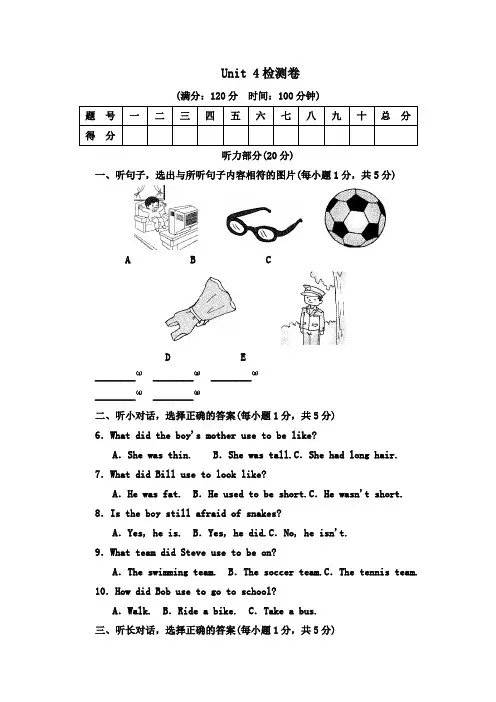
Unit 4检测卷(满分:120分时间:100分钟)听力部分(20分)一、听句子,选出与所听句子内容相符的图片(每小题1分,共5分)A B CD E________(1)________(2)________(3)________(4)________(5)二、听小对话,选择正确的答案(每小题1分,共5分)6.What did the boy's mother use to be like?A.She was thin. B.She was tall.C.She had long hair. 7.What did Bill use to look like?A.He was fat. B.He used to be short.C.He wasn't short. 8.Is the boy still afraid of snakes?A.Yes, he is. B.Yes, he did.C.No, he isn't.9.What team did Steve use to be on?A.The swimming team. B.The soccer team.C.The tennis team. 10.How did Bob use to go to school?A.Walk. B.Ride a bike. C.Take a bus.三、听长对话,选择正确的答案(每小题1分,共5分)听第一段对话,回答第11~12小题。
11.What color is Tina's hair now?A.Black. B.Red. C.Yellow.12.What did Bob use to be like?A.Thin. B.Strong. C.Fat.听第二段对话,回答第13~15小题。
13.How long haven't they seen each other?A.For 2 years. B.For 4 years.C.Since 2 weeks ago. 14.What did the man use to wear?A.Suits. B.Tshirts.C.Jeans.15.Where does the man work now?A.In a school. B.In a bank.C.In a company.四、听短文,回答问题(每小题1分,共5分)16.How many students were there in the speaker's class?A.50. B.55. C.65.17.What did Lily use to be like?A.Outgoing. B.Honest. C.Shy.18.What color is Alfred's hair now?A.Red. B.Colorful. C.Black.19.What did the speaker use to do after school?A.He used to draw pictures.B.He used to play basketball.C.He used to play volleyball.20.How often does the speaker play football?A.Twice a month. B.Twice a week.C.Once a month.笔试部分(100分)五、单项选择(每小题1分,共15分)21.His mother ________ quarrel with his father,but now they get alongwell with each other because of him.A.was used to B.used toC.got used to D.was used for22.What I experienced in the poor mountain villages ______ my life and decision about future.A.caused B.influencedC.appeared D.fought23.Mr Green used to live in Beijing with his daughter, ________?A.did he B.didn't heC.did she D.didn't she24. I saw some boy students ________ basketball when I passed the playground.A.played B.plays C.playing D.to play25.—Has Mike received his mother's mail?—Yes, he signed for it ________ this morning.A.in person B.in fact C.in silence26.—Peter, you got to school by taxi?—Oh, I ________ take a taxi to school, but my bike needs repairing today.A.usually B.sometimesC.never D.seldom27.—Do you still remember that accident, Dean?—Of course. I never forget it ________ it happened many years ago.A.unless B.ever sinceC.only when D.even though28.The girl has walked to school since she was 7 years old. Now she ________ going to school on foot.A.used to B.was used toC.is used to D.is used for29.My friend Lily is such a ________ girl that everyone in our class likes her very much.A.proud B.nervousC.absent D.humorous30.—________ my surprise, Jin Ming was chosen into our school football team.—Congratulations. He did well ________ playing football when he was very young. I hope he'll be the best player in our school.A.To; of B.At; atC.To; in D.In; about31. We advise parents ________ their children at home alone in order to keep them away from danger.A.not leave B.not to leaveC.leave D.to leave32. Jenny's uncle is a scientist. She is proud ________ him.A.from B.at C.in D.of33.—________ you ________ take a bus to school?—Yes. But now I usually go to school on foot.A.Did;use to B.Do;used toC.Do;use to D.Did;used to34.As a reporter, I want to ________ Ma Yun about how to become the richest man in China.A.require B.repeat C.admire D.interview35.—Li Ming won first prize in this chess competition.—Really? His parents must ________ him.A.look after B.wake upC.be angry with D.take pride in六、完形填空 (每小题1.5分,共15分)(词数:约220;建议用时:7分钟)A teacher had been made very angry by some of his boys making ahigh sound during school hours. At last he was forced to ________(36) any one who should repeat the wrong act. The next morning, a loud sound was heard in the quiet room. The students were very much surprised, and the teacher at once looked around to ________(37) the person who had made a high sound.When a boy who was often in bad act, was told he was wrong, he ________(38) said he hadn't done it, yet his words were not believed, and he was brought up for punishment. Seeing what was about to take place, Charles, a little boy, got up suddenly from his ________(39).“Don't punish John, sir. I made the high sound. I'm very sorr y. I didn't mean to whistle.” He held out his hand to be punished. Taking the little boy's ________(40), the teacher said, “Charles, you have done right. I can't punish you after you ________(41)so nobly.” Even the youngest child in the school felt ________(42)of Charles, for every child could see how bravely he had acted.Charles was truly a brave boy. He had done ________(43)he knew to be right. True courage may also be shown by ________(44)to do that which we know to be wrong, ________(45)bad people may laugh at us.36.A.punish B.praise C.fix D.hurt37.A.hide B.discover C.pay D.wake38.A.actively B.aloudC.strongly D.softly39.A.bag B.board C.desk D.seat40.A.hair B.arm C.finger D.hand41.A.have given B.have runC.have acted D.have fallen42.A.afraid B.proud C.sure D.careful43.A.what B.which C.who D.when44.A.refusing B.continuingC.dreaming D.wanting45.A.but B.though C.after D.until七、阅读理解(每小题2分,共30分)A (词数:约380;建议用时:8分钟)Decide to Do WellEverybody makes decisions in daily life.They can be as important as what you will do in the future or as simple as what you will eat for breakfast.Any decision could be the turning point of your life.I made an important decision when I was in Junior 3.Before I made that decision I was one of the boys who tried too hard to act as an adult.I didn't know that only kids want to show themselves as adults.I didn't listen to my parents and teachers,and my grades became poor.Then came the high school entrance exam.At the turning point of my life,my mom wanted to have a conversation with me.I wanted to turn it down but when I looked at her eyes,I felt I couldn't refuse.Instead of asking me to study hard,to my surprise,Mom just asked what I wanted to do in the future.Without thinking too much,I just said I would like to study hard.Mom smiled and asked again:“I asked: what do you WANT to do?”I never seriously thought about the question.So,I kept silent.“Whether you want to go on studying or enter the society,”she went on,“it is your own decision.Your life ought to be decided by you,not by anyone else,including me.”After saying that,she had tears in her eyes.For the first time in my life I was asked to make my own decision.I sat in my chair and thought about myself,my life and what kind ofperson I wanted to become.It took me what seemed to be ages to make the biggest decision so far in my life—I wanted to be a man who makes a difference in the world.To achieve that,I needed to study hard.The path to my future became clear to me.I didn't act rebelliously(叛逆地) any more.With passion (激情) in my heart,I studied hard.Now,I'm 17 and I'm in one of the best schools in my city,in one of the best classes at the school and I am one of the best students in the class.Thanks to that decision,I have become what I am today. 46.When did the writer make the important decision?A.After he was 17 years old.B.After he was in one of the best classes.C.When he was a pupil.D.When he was studying in Junior 3.47.What was the writer like before the decision?A.His grades became poor.B.He tried too hard not to act as an adult.C.He was one of the top students in his class.D.He did what his teachers and his parents asked him to do. 48.How did the writer make the decision?A.It was easy for him to make the decision.B.It was his second time to make the decision.C.He made the decision seriously.D.It was his mother that made the decision for him.49.Why did the writer make the decision?A.Because his teacher talked with him patiently.B.Because he didn't want to act rebelliously any more.C.Because his mother asked him to study hard as usual.D.Because his father asked him to think about his future by himself.50.Which of the following is TRUE?A.The writer made the decision that he should work hard.B.It took the writer several years to make the decision.C.After hearing his mother's words,the writer had tears in his eyes.D.At the turning point of his life,the writer wanted to havea conversation with his mother.B (词数:约170;建议用时:5分钟)An eightyyearold couple were having trouble with their memories. One day, they decided to see a doctor. The doctor told them that there was nothing serious, but he suggested that they should start writing things down to help them remember things. The couple thanked the doctor and left.Later that night while watching TV, the old man got up from his chair and his wife asked, “Where are you going?”“To the kitchen.”“Will you get me an ice cream?” asked the wife.“Sure.”Then his wife asked him to write it down.“No, I can remember that,” replied the husband.“Well, I also want some strawberries and cream on top. You'd better write it down, or you will forget that,” said the wife.“No, I can remember that,” the husband got a little unhappy and went into the kitchen.After about 20 minutes, the husband returned with a plate of fish. The wife laughed, “Haha! Your bad memory! I wanted some bread withcream.”51.How old was the wife?A.Eight. B.Eighteen.C.Eighty. D.Eighties.52.Why did the couple go to the doctor's?A.Because they had a headache.B.Because they had bad memories.C.Because the doctor was their son.D.Because the old man was ill.53.What did the husband give to the wife?A.An ice cream.B.Some strawberries and cream.C.Some bread with cream.D.Some fish.54.What did the wife really want?A.Some bread with cream.B.An ice cream with some strawberries and cream.C.A plate of fish.D.Some strawberries and cream.55.Which sentence is right?A.The couple often forgot some things.B.Only the husband had a bad memory.C.The couple were ill.D.The doctor also had a bad memory.C (词数:约280;建议用时:8分钟)There is little rain in deserts. Because deserts are so dry, they have no “quilt” to help stop the soil from going away. As a result, they may get very hot during the day with the sun shining, but don't hold the heat overnight. Many deserts can quickly get cold once thesun goes down. Some deserts can reach temperatures of over 100 degrees F during the day and then drop below freezing (32 degrees F) during the night.The largest hot and dry desert in the world is the Sahara Desert in Northern Africa. The Sahara is a sandy desert with great sand hills. It covers over 3 million square miles of Africa. Other large deserts include the Arabian Desert in the Middle East, the Gobi Desert in Northern China and Mongolia, and the Kalahari Desert in Africa.Animals that live in the desert are also used to needing little water. Many get all the water they need from the food they eat. Other animals keep water that they can use later. The camel stores up fat in its hump while other animals keep something they need in their tails.Only certain types of plants can live in the terrible environment of the desert. You won't see a lot of tall trees in the desert. Most plants have a way to keep water in their leaves or trunks so they can live a long time without water.Now deserts cover around 20% of the world's land, but they are growing. This is called desertification and is caused by different reasons including human activities. The Sahara Desert is growing larger and larger each year. What should we do with it?56.How is the weather during the night in the desert?A.Hot. B.Cold. C.Cool.57.Where does the camel store up fat?A.In its hump. B.In its stomach.C.In its tail.58.Why won't we see a lot of tall trees in the desert?A.Because of few people there.B.Because of the sun shining.C.Because of the terrible environment.59.How much of the land do deserts cover in the world?A.One fifth. B.Less than 10%.C.Two fifths.60.Is the Sahara Desert growing or not?A.Nobody knows it. B.It's growing.C.It's not growing.八、词汇运用(每小题1分,共10分)(一)根据汉语提示完成句子。

人教版英语九年级Unit 4《I used to be afrd of the dark》全单元教学设计一. 教材分析人教版英语九年级Unit 4的主题是“I used to be afrd of the dark”,主要讲述了人们过去和现在的变化。
本单元包括两个部分:Part A和Part B。
Part A包含一个听力任务、一个口语任务和三个阅读任务,而Part B包含一个口语任务、两个阅读任务和一个写作任务。
教材内容丰富,旨在提高学生听说读写四项基本技能,同时培养他们的文化意识和跨文化交流能力。
二. 学情分析九年级的学生已经具备了一定的英语基础,能够运用所学知识进行简单的交流。
但是,他们在词汇、语法和听力方面还存在一定的困难。
因此,在教学过程中,教师需要关注学生的个体差异,充分调动他们的学习积极性,激发他们的学习兴趣。
三. 教学目标1.知识目标:学生能够掌握本单元的重点词汇和语法知识,正确运用一般过去时描述过去和现在的变化。
2.能力目标:学生能够在不同情境下运用所学知识进行听说读写操作,提高他们的语言运用能力。
3.情感目标:学生能够了解并尊重文化差异,培养跨文化交流的能力。
四. 教学重难点1.重点:本单元的重点词汇和语法知识,以及一般过去时的运用。
2.难点:一般过去时的运用,以及如何在实际情境中进行跨文化交流。
五. 教学方法1.任务型教学法:通过完成各种任务,激发学生的学习兴趣,提高他们的实践能力。
2.情境教学法:创设真实的情境,帮助学生理解并运用所学知识。
3.交际法:鼓励学生积极参与课堂交流,提高他们的口头表达能力。
六. 教学准备1.教师准备:备好相关教学材料,如PPT、听力材料、阅读材料等。
2.学生准备:预习本单元内容,完成相关的自主学习任务。
七. 教学过程1.导入(5分钟)教师通过提问方式引导学生回顾上一单元学过的内容,激发学生的学习兴趣。
例如:“Do you remember what we learned in the last unit? How was your weekend?”2.呈现(10分钟)教师通过展示PPT或实物,呈现本节课的主题“I used to be afrd ofthe dark”,引导学生关注一般过去时的运用。
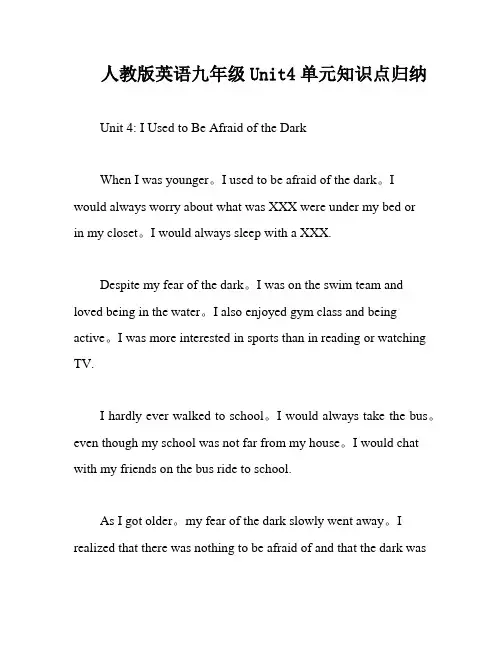
人教版英语九年级Unit4单元知识点归纳Unit 4: I Used to Be Afraid of the DarkWhen I was younger。
I used to be afraid of the dark。
Iwould always worry about what was XXX were under my bed orin my closet。
I would always sleep with a XXX.Despite my fear of the dark。
I was on the swim team and loved being in the water。
I also enjoyed gym class and being active。
I was more interested in sports than in reading or watching TV.I hardly ever walked to school。
I would always take the bus。
even though my school was not far from my house。
I would chat with my friends on the bus ride to school.As I got older。
my fear of the dark slowly went away。
I realized that there was nothing to be afraid of and that the dark wasjust a natural part of life。
Now。
I can sleep without a nightlight and am not afraid of the dark anymore.Looking back。
I realize that my fear of the dark was just a phase that I went through。
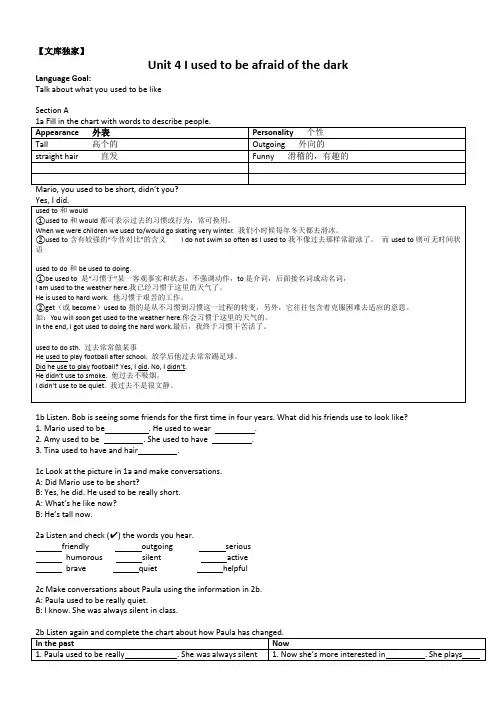
【文库独家】Unit 4 I used to be afraid of the darkLanguage Goal:Talk about what you used to be likeSection A1b Listen. Bob is seeing some friends for the first time in four years. What did his friends use to look like?1. Mario used to be . He used to wear .2. Amy used to be . She used to have .3. Tina used to have and hair .1c Look at the picture in 1a and make conversations.A: Did Mario use to be short?B: Yes, he did. He used to be really short.A: What’s he like now?B: He’s tall now.2a Listen and check (✔) the words you hear.friendly outgoing serioushumorous silent activebrave quiet helpful2c Make conversations about Paula using the information in 2b.A: Paula used to be really quiet.B: I know. She was always silent in class.2d Role-play the conversation.Alfred: This party is such a great idea!Gina: I agree. It’s been three years since we last saw our primary school classmates.Alfred: It’s interesting to see how people have changed.Gina: Billy has changed so much! He used to be so shy and quiet.Alfred: Yeah, his face always turned red when he talked to girls!Gina: I used to see him reading in the library every day.Alfred: That’s because he was a really good student. He s tudied hard and got good scores on his exams.Gina: Did he use to wear glasses?Alfred: Yes, and he used to be thin, too. But look how big and strong he is now!Gina: He’s so popular now. Look at all the girls around him!艾尔弗雷德:这次聚会是如此好的一个主意!吉娜:我同意。

丰南区初中英语教学设计教学目标通过本课时的学习,学生能够:1. 能够围绕“我们所发生的变化”的话题,通过总结本单元所学重点句型,学会描述自己的变化;能够正确使用used to结构等多种时态谈论人物和环境所发生的变化。
(学习理解)2. 能够在老师的帮助下,通过学习,总结有关“我们所发生的变化”的语言知识;在写作中,注意到语篇的整体性、结构性、逻辑性。
(应用实践)3. 能够学会珍惜并接受身边事物的变化,明白事物是在不断发展、变化的道理,培养其积极向上的心态。
(迁移创新)教学重难点重点:本单元所学关于“我们所发生的变化”话题下的词汇和used to结构的正确运用;学会写作,描述自己生活中的一些变化情况;难点:采取说明文的体裁,运用多种时态,有逻辑、有条理、有感情地描述自己生活中的一些变化情况。
教学过程教学目标学习活动效果评价1. 能够围绕“我们所发生的变化”的话题,通过总结本单元所学重点句型,学会描述自己的变化;能够正确使用used to结构等多种时态谈论人物和环境所发生Activity 1: Lead-inReview the changes of Candy Wang and Li Wen.Let’s read the article about Candy Wang and Li Wen.Candy used to …, but now she is …Candy suggests that …Li Wen used to…, but now he is …观察学生回答问题的表现,预判学生的能力并了解学生的已知内容,根据需要给予必要的指导的变化。
(学习理解)Li Wen realizes that …2. Now we talk about their changes.Do you have similar experience? How did you deal with it?设计意图:复习小阅读和大阅读的重点句型和结构,用所学知识引导学生写作。
Unit 4 I used to be afraid of the dark Section A1. dark1)adj.黑暗的It’s dark before 6 in winter. 冬天在6点钟之前天就黑了2)adj. 深的(用于形容颜色)a dark blue skirt一件深蓝色的裙子3)un. A. (the dark)黑暗I used to be afraid of the dark.我过去怕黑。
B. (前无the)天黑,晚上We must get there before dark.我们必须在天黑之前到达那儿。
2. used to do sth. 过去常常做某事(否定结构:usedn’t to do sth. / didn’t use to do sth. 一般疑问句结构:Did sb use to do sth.? / used sb to do sth?)be/get/become used to + n. / pron. / /doing sth.习惯于(做)某事be used to do sth. 被用来做某事(被动语态)be used for doing sth. 被用来做某事be used as 被作为……使用be used by sb. 被某人使用1) 他过去常常放学后踢足球。
He _________________after school.2) 他过去常常踢足球吗?3)他过去不吸烟。
4)我过去不是很文静。
5)他习惯于早起床。
6)木材被用来造纸。
Wood7)小刀是用来切东西的。
3. Don’t you remember me? 你不记得我了吗?(否定疑问句.根据事实回答)Yes, I do. 不, 我记得. No, I don’t 是的, 我不记得了4. wait a minute 等一等5. be more interested in 对…更感兴趣.6. be on the swim team = be a member of the swim team 在游泳队效力(是游泳队队员)7. sure1) adj.“确信的,确实的,一定……的”①be sure of sth确信某事②be sure+that从句:确信……③be sure to do sth必定会做某事2) adv ①无疑,确实②好,当然,没问题(用于应答)A.他深信自己会成功。
人教版九年级全一册英语Unit 4 知识点总结(含短语+句型+精讲+作文)Unit 4 I used to be afraid of the dark.一、课内短语归纳1. used to do 过去常常做2. deal with 对付应付3. be proud of 为……骄傲,感到自豪4. take pride in 为……感到自豪5. from time to time 时常,有时6. in public 公开地7. in person 亲身,亲自8. take up sth 开始做,接受,占用9. not……anymore 不再10. worry about 为……担忧11. hang out 闲逛12. think about 考虑13. be alone 独处14. on the soccer team 在足球队15. no longer 不再16. make a decision 做决定17. to one’s surprise 令某人吃惊的是18. even though 尽管19. pay attention to 对……注意,留心20. in the last few years 在过去的几年里21. be afraid of 害怕22. turn red 变红23. tons of attention 很多关注24. be careful 当心25. give up 放弃26. a very small number of …极少数的……27. give a speech 作演讲28. all the time 一直总是29. be interested in 对……感兴趣30. change one’s li fe 改变某人的生活31. take care of 照顾32. one of… ……之一二、重点词汇解析1. silentsilent是形容词,意为“沉默的;无言的”,其名词形式为silence。
Unit4 I used to be afraid of the dark【必背短语】1. be more interested in 对…更感兴趣.2. on the swim team 游泳队的队员.3. be terrified of 害怕.4. gym class 体操课.5. worry about 担心.6. all the time 一直, 总是7. chat with 与…闲聊8. hardly ever 几乎从不9. walk to school =go to school on foot 步行去上学take the bus to school =go to school by bus 乘车去上学10. as well as 不仅…而且【细节知识点】1. used to do sth. 过去常常做某事be used to doing sth 习惯做某事be used to do sth 被使用去做某事如:He used to play football after school. 放学后他过去常常踢足球。
2.反意疑问句(原则,前肯定后否定,前否定后肯定)①肯定陈述句+否定提问如:Lily is a student, isn't she?②否定陈述句+肯定提问如:She doesn't come from China, does she?③提问部分用代词而不用名词如:Lily is a student, isn't she?④陈述句中含有否定意义的词如:little, few, never, nothing, hardly等,其反意疑问句用肯定式(对于第四点大家不要忽视,尤其是列举的这几个词,出题的时候经常遇到,对于下面的两个例子大家要仔细看一下,要把这个知识点彻底搞懂)。
He knows little English, does he? 他一点也不懂英语,不是吗?They hardly understood it, did they? 他们几乎不明白,不是吗?3.①be interested in sth. 对…感兴趣②be interested in doing sth. 对做…感兴趣(对于这两个用法大家一定要掌握,切记切记)如:He is interested in math, but he isn't interested in speaking English.interested adj. 感兴趣的,指人对某事物感兴趣,往往主语是人interesting adj.有趣的,指某事物/某人具有趣味,主语往往是物类似的这种形容词还有很多,比如excited exciting 等,ed结尾的一般主语指人,ing结尾的一般主语是物4. be terrified of sth. 害怕……如:I am terrified of the dog.be terrified of doing sth. 害怕做……如:I am terrified of speaking.5. walk to somewhere :步行到某处6. spend 动词,表示“花费金钱、时间”(spend和pay for 它们的主语都是人,这一点大家要清楚)①spend…on sth. 在某事上花费(金钱、时间)(重要考点)②spend…doing sth. 花费(金钱、时间)去做某事(重要考点,尤其要注意动名词,也就是动词的ing形式,很容易出现在选择题中)He spend 3 months building the bridge. 他花费了三个月去建这座桥。